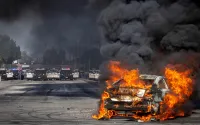BBC News21 January 2003
You never need an argument against the use of violence, you need an argument for it. And the arguments that have been given for it are not convincing.
There is no debate about the importance of disarming Iraq and indeed other countries that have the capacity to use weapons of mass destruction. That is very important and everyone agrees on it.
" Sane people do not undertake actions when they know that there is reasonable possibility that it may lead to a humanitarian catastrophe "
The way to proceed with that is the way that has been done - with careful inspection procedures and efforts to ensure that the US and Britain and others will no longer carry out the policies of the past and provide Saddam with means for developing weapons of mass destruction.
It is extremely unlikely that Saddam Hussein would use nuclear weapons, which is a recipe for instant suicide - except in a desperate reaction to an attack.
So we should certainly do everything to prevent him from developing weapons of mass destruction.
I think that nobody doubts that the world would be better off if he is eliminated. But the means that are proposed are outlandish.
The means that are proposed are that we should carry out an attack which we understand may cause very severe humanitarian catastrophe and might also lead to the only real likelihood of his using weapons of mass destruction.
Anti-war sentiments
There is simply no historical precedent in the history of the United States or of Europe for such overwhelming opposition to a war at this stage - that is before it has even been undertaken.
US OPINION63% would support military action - 3% would not 60% want US goals in Iraq achieved without military force 81% support war if the US is backed by major allies and the UN Security Council Only 39 % support war if the United States does not have UN backing Source: Newsweek
The US planners are well aware that it is not a situation like the 1960s, when you can carry out aggression and violence for years with no public opposition. Now the popular consciousness has just changed.
You can declare victory over the much weaker enemy - but anything longer than that is going to arouse the public which simply is not as willing to accept aggression and violence as Europe and the United States have been in the past.
Whether there will be large-scale humanitarian catastrophes, nobody knows.
It is a reasonable possibility and sane people do not undertake actions when they know that there is reasonable possibility that it may lead to a humanitarian catastrophe unless they have enormously powerful arguments.
The arguments that they have put forward are so weak that there can be no choice about this.
Noam Chomsky teaches linguistics at the Massachusetts Institute of Technology. He recently published 9-11, a book about terrorism and US foreign policy. He was speaking to the BBC's Today programme
He presented his views on the 11 September attacks in a video essay at the time of the first anniversary:






